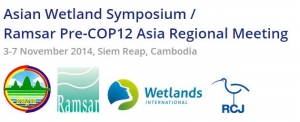Newsroom :: News :: Mangroves identified as important wetlands for disaster risk reduction at Asian Wetlands Symposium
Mangroves identified as important wetlands for disaster risk reduction at Asian Wetlands Symposium
The Ramsar Pre-COP 12 Regional Meeting identifies MFF and IUCN as focal points for Asia
Location: Siem Reap, Cambodia. 6th Nov 2014
Asia remains one of the most hazard prone regions of the world today and must proactively manage its disaster risk. It is well established that healthy ecosystems contribute significantly to reducing vulnerability to hazards by providing physical buffers that reduce the impacts of hazard events as well as by providing sources of livelihood and food security.
However widespread degradation and loss of coastal ecosystems over the past 50 years has led to a serious decline in resilience of these social ecological systems. This has been caused by a number of drivers including; conversion of coastal forests and wetlands to aquaculture and agriculture, urban expansion and development, pollution, sedimentation, erosion, hydrological changes, and overexploitation and extraction of fisheries and other resources.
The recent UNEP report, "The Importance of Mangroves to People: A Call to Action (2014)" sates that ‘mangroves are being destroyed at a rate 3-5 times greater than the average rates of forest loss’ and that ‘emissions resulting from mangrove losses make up nearly one-fifth of global emissions from deforestation, resulting in economic damages of some US$6-42 billion annually’.
The 2014 Indian Ocean Tsunami was one of the worst disasters to hit the Asian region in recent times. The event renewed understanding of the vital importance that coastal ecosystems play for the protection and well-being of coastal communities. Lessons from the 2004 Indian Ocean Tsunami also gave rise to the Mangroves for the Future (MFF) initiative, a unique partner-led initiative promoting investment in costal ecosystems for sustainable development and increased resilience of coastal communities.
MFF promotes policies and practice for integrated coastal ecosystems management and works to achieve demonstrable results through influencing regional corporation, supporting national programmes, private sector engagement and community action. This is realized through concerted actions and projects that generate and share knowledge, empower institutions and people, and strengthen governance.
During the discussions at the session on "Emerging issues on wetlands and disaster risk reduction", the Ramsar Pre-COP 12 Regional Meeting identified MFF (through Ms Maeve Nightingale, Capacity Development Manager), and IUCN (through Mr Raphael Glemet, Senior Programme Officer, Water and Wetlands, Natural Resources Group) as focal points for Asia.
What is the Asia Wetlands Symposium?
The Asian Wetland Symposium provides an opportunity for discussions among various sectors including national and local governments, NGOs, scientists, private sector, and local and indigenous people engaged in wise use of wetlands on issues, approaches and priorities relating to the conservation and wise use of wetlands in Asia.
This will be the 7th Asian Wetland Symposium (AWS). Previous AWS meetings were held in Japan, Malaysia, India, Viet Nam and China. These symposiums brought together thousands of people to identify priorities in wise use of wetlands in Asia. The recommendations from previous symposiums have provided valuable guidance to the Conference of Parties to the Ramsar Convention.
The importance of the Asian Wetland Symposium has been recognized by the Parties to the Ramsar Convention and at the 9th Conference of the Parties they adopted Resolution IX. 19, that states "requests Contracting Parties, in cooperation with the Ramsar Secretariat and international NGOs, to facilitate the support to and the participation in the Asian Wetland Symposia by a wide range of stakeholders, including but not limited to local governments, NGOs, the private sector, and local communities...."
The Ramsar Pre-COP12 Asia Regional Meeting (RARM) is an important opportunity to review progress on implementing the Ramsar Convention on Wetlands prior to the 12th Conference of Parties (COP12) to the Convention which will be held in Uruguay, in June 2015. RARM will also allow discussion and development of regional inputs into the Draft Resolutions that will be presented at COP12.
For more information, please contact:Ms Maeve Nighingale, MFF Capacity Development Manager, through the MFF Secretariat (secretariat@mangrovesforthefuture.org)or visit the Asian Wetlands Symposium website.

Asian Wetlands Symposium 2014, Siem Reap, Cambodia © AWS, 2014